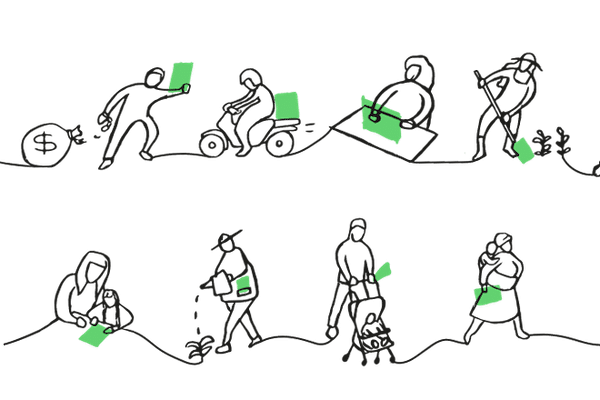TRICONTINENTAL INSTITUTE FOR SOCIAL RESEARCH

The most scandalous fact of the current period is that 2.37 billion people are struggling to eat. Most of them are in developing countries, but many are in advanced industrial states. Governments in developed countries say that there is not enough money to abolish hunger or any of the other afflictions of the modern era, whether it be illiteracy, ill health, or homelessness. However, during the pandemic, the central banks of these countries conjured up $16 trillion to protect the wavering capitalist system. Resources were readily available to save firms, but not to save hungry people: that is the moral compass of our times.
In this period, the research institutes of the capitalist states have set up new entities and published a slew of reports offering supposed remedies to ‘save capitalism’. Among these new institutions are the Council for Inclusive Capitalism (whose partners include the Bank of England and the Vatican) and the B Corporation Movement. The World Economic Forum (WEF) and the Financial Times have made the case for a ‘great reset’ to make capitalism ‘more inclusive’. ‘The pandemic represents a rare but narrow window of opportunity to reflect, reimagine, and reset our world’, says WEF Founder and Executive Chairman Klaus Schwab. Those who have brought us to the threshold of extinction and annihilation claim that they know how to fix our world. As expected, their ‘inclusive capitalism’ offers no clear programme, nothing beyond empty rhetoric.
Meanwhile, in mid-2021, twenty-six research institutes from around the world began to meet and discuss the production of a draft programme to address the current crisis. Under the leadership of the Bolivarian Alliance for the Peoples of Our America–Peoples’ Trade Treaty (ALBA-TCP), our meetings produced a document called A Plan to Save the Planet. That plan is published in this dossier. It is intended for discussion and debate.
One of the key points of differentiation between A Plan to Save the Planet and the various documents for ‘inclusive capitalism’ is that we do not believe that capitalism is a system that can benefit humankind–no matter the rebranding–and we do not believe that the dilemma facing us can be chalked up to a ‘coronavirus crisis’. Instead, we argue that we are facing a crisis of capitalism in general, a crisis that can only be overcome by a change in course towards a system designed around the needs of the working class and the peasantry and the requirements of a sustainable natural world. The bulk of this dossier will lay out our orientation, principles, and horizon. This introduction examines the arguments for ‘inclusive capitalism’ and reveals how–at the end of the day–they obsessively seek to distract attention from the failures of capitalism and blame China for all of capitalism’s ills.
The Crisis of Capitalism
By calling it the ‘coronavirus crisis’, the managers of capitalism are suggesting that the pandemic is to blame for global economic decay and not the social order itself. This has two consequences: first, it hides the crisis of capitalism; second, it blames the worsening conditions of the working class on the pandemic as opposed to a system that maximises profit over all else.
When the pandemic struck, the hollowed-out institutions of the state and of society in the capitalist countries broke apart. The pandemic illuminated the rot, but it did not create it. Rather, the long-term erosion of state institutions and of social life was a product of a structural crisis with three core dimensions:
- The general capitalist crisis, which is inflicted on the system by the fierceness of competition and the profit motive. This secular crisis is capable of periodic booms and crashes, with recovery premised upon the elimination of weaker capitalists, the development of new forms of exploitation, and the creation of new markets.
- The crisis engendered by neoliberalism, through which capitalist classes have exerted their power over the state to reduce its ability to intervene in the market and to produce positive net social wages for labour. This includes severely cutting spending on health care and social welfare.
- The prolonged depression-like crisis that followed the 2007–08 financial collapse, the impact of which remains deeply rooted in the structure of financialisation and of the global value chain system. Profit from finance is higher than manufacturing, which drives investment towards non-productive sectors; the global value chain system drives productive jobs to areas of the world where wages are held indecently low by the pressures of imperialism.
These three dimensions of the crisis have inflicted a serious blow to capitalism, each with a different tempo. Recovery from this seems impossible to fathom unless a suite of new technologies emerges to enhance productivity and employment growth in the advanced capitalist states. Opportunist sectors of the capitalist class are making use of the climate change discourse to drive public funds into private hands and to attempt to modernise capitalism.
Monthly Review Online for more

